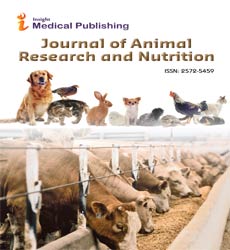Application of Biotechnology for Genetic Improvement in Fish Farming
Ravi Kumar Biradar
DOI10.36648/2572-5459.5.2.65
Department of Biotechnology, Bharath University, India
- Corresponding Author:
- Biradar RK
Jain (Deemed-to-be University)
Bangalore, India
E-mail: ravikumar.aer@gmail.com
Received Date: July 01,2020; Accepted Date: July 24,2020; Published Date: July 30,2020
Citation: Biradar RK (2020) Application of Biotechnology for Genetic Improvement in Fish Farming. J Anim Res Nutr Vol.5 No.2:65 doi:10.36648/2572-5459.5.2.65
Copyright: © 2020 Biradar RK. This is an open access article distributed under the terms of the creative commons attribution license which permits unrestricted use, distribution and reproduction in any medium, provided the original author and source are credited.
Short Communication
Biotechnology innovative work is moving at a quick rate. The subject has expected most noteworthy significance lately in the advancement of agribusiness and human wellbeing. The study of biotechnology has enriched us with new devices and gigantic influence to make novel qualities and quality kind of plant, creatures, including fish. In expansive terms, biotechnology can be characterized as any mechanical application that utilizes natural frameworks, living creatures or subordinates thereof, to make or adjust items or procedures for explicit use. This reaches from the utilization of engineered hormones in initiated rearing, hybridization, creation of monosex, uniparental and polyploidy, sub-atomic science, transgenic fish to quality banking. There is extensive premium worldwide in applying hereditary designing to aquaculture. One explanation is that as the world catch of wild fish is quickly moving toward the assessed most extreme possible collect at 100-150 million tons, an expanding interest for marine proteins is probably going to be given by aquaculture. Another explanation is that hereditary designing can possibly tailor fish species for cost effective aquaculture creation of fish proteins, either alone or in mix with customary rearing strategy. Because of the expansion in development pace of the total populace, the interest for fish is taking off worldwide and it shows up impossible that the expanding request can be met through expanded normal harvests the same number of the seas and characteristic freshwater fisheries are being reaped as far as possible.
Aquaculture not at all like catch fisheries requires purposeful human intercession in the life form profitability and yields that surpasses those from the common habitat. Aquaculture, subsequently, remains the last trust in giving enough fish to the world, yet with constrained land and water space. Aquaculture biotechnology, subsequently, has come to have a key task to carry out as it can make an extraordinary commitment to improving aquaculture yields. The use of biotechnology to different creation frameworks doesn't come without its negative effects however even still; the benefits far exceed the related concerns in light of the fact that the methods are continually being grown in this way decreasing the negative effects thereof. Along these lines, there is have to embrace biotechnological rehearses if the world is to have any possibility of accomplishing food security. The use of biotechnology in the aquaculture division is a moderately ongoing practice. In any case, it is a promising zone to improve fish creation. The expanded use of biotechnology instruments can surely change our fish cultivating other than its job in biodiversity. Exploration shows that a portion of the cutting edge hereditary advancements are now broadly applied by the different aquaculture businesses, however not similarly for exceptionally significant aquaculture species. The colossal effect that biotechnology is having in aquaculture has been especially evident as of late. Chromosome set control procedures, which permit sex-control and sanitization, and transgenic methods that give upgrades in physical development, illness obstruction and cold opposition are away from of the significance of the utilization of biotechnology in the aquaculture business [1]. Biotechnology has two significant jobs in aquaculture: it can improve the financial effectiveness of aquaculture and it can likewise add to the supportability of aquaculture and the insurance of wild stocks [2].
The capable and fitting use of biotechnology will empower the advancement of reasonable aquaculture and encourage the simultaneous upkeep of wild stocks for their business, recreational and intrinsic stylish worth. Because of the expansion in development pace of the total populace, the interest for fish is taking off worldwide and it shows up far- fetched that the expanding request can be met through expanded normal harvests the same number of the seas and characteristic freshwater fisheries are being reaped as far as possible. The utilization of biotechnology to different creation frameworks doesn't come without its negative effects yet even still, the benefits far exceed the related concerns in light of the fact that the procedures are continually being grown in this way diminishing the negative effects thereof. Thusly, there is have to embrace biotechnological rehearses if the world is to have any possibility of accomplishing food security. Biotechnology can possibly upgrade proliferation and the early formative achievement of culture living being.
References

Open Access Journals
- Aquaculture & Veterinary Science
- Chemistry & Chemical Sciences
- Clinical Sciences
- Engineering
- General Science
- Genetics & Molecular Biology
- Health Care & Nursing
- Immunology & Microbiology
- Materials Science
- Mathematics & Physics
- Medical Sciences
- Neurology & Psychiatry
- Oncology & Cancer Science
- Pharmaceutical Sciences
